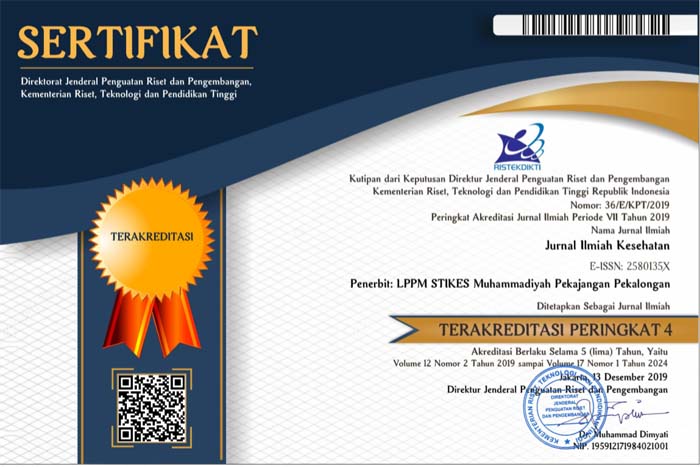Efektivitas Massage Terapi Effleurage Guna Mencegah Kejadian Depresi Postpartum Pada Ibu Nifas
DOI:
https://doi.org/10.48144/jiks.v12i1.129Abstract
Abstrak
Depresi postpartum merupakan gangguan alam perasaan (mood) yang dialami oleh ibu pasca persalinan. Tingkat insiden depresi postpartum di Indonesia bervariasi yaitu Bandung 30%, Medan 48,4%, dan Jakarta 76%. Di RSUD Kebumen di dapatkan kemungkinan depresi rendah 75,8%, baby blues 15,4%, kemungkinan depresi postpartum 2,2%, dan depresi postpartum adalah 6,6%. Depresi postpartum berdampak negatif pada kesehatan ibu karena menurunkan kemampuan mengasuh anak, berespon negatif dan ketertarikan terhadap bayinya kurang, serta malas menyusui. Upaya penanganan depresi postpartum tanpa menggunakan obat salah satunya dengan massage terapi efflurage karena dapat meningkatkan hormone morphin endogen sekaligus menurunkan kadar stress hormon.Tujuan penelitian ini mengetahui efektifitas massage terapi effleurage guna mencegah kejadian depresi postpartum pada ibu nifas di Wilayah Kabupaten Kebumen. Metode penelitian menggunakan quasi eksperimen dengan rancangan Non-Equivalent Control GroupDesign menggunakan Pre Test - Post test Only. Teknik pengambilan sampel menggunakan consecutive sampling dengan jumlah sampel 22 ibu post partum pada kelompok intervensi maupun kontrol. Hasil penelitian dengan uji paired t-test didapatkan hasil bahwa pada ibu nifas dengan massage terapi effleurage nilai p-value 0,000 dengan taraf signifikansi p < 0,005 sedangkan nilai t-hitung 2.67080. Dapat disimpulkan bahwa massage terapi dengan tehnik effleurage pada ibu nifas mempunyai efektivitas 2x lebih tinggi untuk pencegahan depresi postpartum pada ibu nifas.
Kata kunci; massage effleurage, depresi postpartum
Â
Effectiveness of Effleurage Therapy Massage to Prevent Postpartum Depression
in Postpartum Mothers
Abstract
Postpartum depression is a disorder of the mood experienced by postpartum mothers. The incidence rate of postpartum depression in Indonesia varies, namely Bandung 30%, Medan 48.4%, and Jakarta 76%. In Kebumen General Hospital there was a possibility of a low depression of 75.8%, baby blues 15.4%, possibility of postpartum depression 2.2%, and postpartum depression was 6.6%. Postpartum depression has a negative impact on maternal health because it reduces the ability to care for children, responds negatively and attracts less children, and is lazy to breastfeed. Efforts to treat postpartum depression without using drugs are one of them by efflurage therapy massage because it can increase endogenous morphine hormones while reducing levels of stress hormones. The purpose of this study is to know the effectiveness of effleurage therapy massage to prevent postpartum depression in postpartum mothers in Kebumen District. The research method used quasi experiment with the design of Non-Equivalent Control Group Design using Pre Test - Post test Only. The sampling technique used consecutive sampling with a sample of 22 post partum mothers in the intervention and control groups. The results of the study with paired t-test showed that in postpartum mothers with effleurage massage therapy the value of p-value 0,000 with a significance level of p <0,005 while the calculated value was 2,67080. It can be concluded that therapeutic massage with effleurage technique in postpartum mothers has a 2x effectiveness higher for prevention of postpartum depression in postpartum mothers.
Keywords; massage effleurage, postpartum depression












